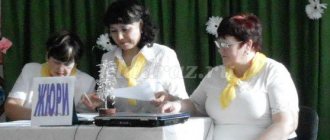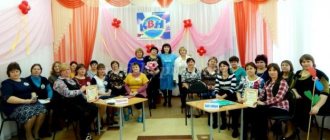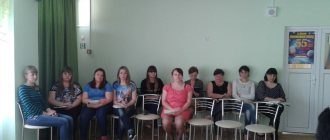Business game as a form of methodological work in preschool educational institutions
Definition 1
Methodological work in a preschool educational institution is an educational activity aimed at teachers mastering methods and techniques for organizing the educational process in a preschool institution and using them in their practice.
This type of activity is aimed at increasing the efficiency and quality of educational services provided by preschool educational institutions. It is associated with the use of measures for the development of each educator, improving his professional skills, expanding and deepening his experience.
The methodological work of preschool educational institutions is based on the use of various methods and means that involve the teacher in active work and the use of a creative approach in their activities.
Are you an expert in this subject area? We invite you to become the author of the Directory Working Conditions
Active methods of methodological work contribute to the creative development of the teacher and the creative direction of his teaching and educational work in preschool educational institutions. They expand the professional skills of a teacher and help overcome passivity in the work of a teacher.
One of the active methods of methodological work is a business game.
Definition 2
A business game is a way of simulating the educational process and its individual aspects, during which the basics of management activities and the organization of educational work are mastered.
Business games allow you to create an image, a model of the educational process of a preschool educational institution and develop effective directions for its implementation, taking into account specific conditions, resource support, and teacher capabilities.
A business game helps:
- Forming the teacher’s experience of activity, which can be used in the real educational process of a preschool educational institution.
- Development of skills for resolving problematic educational situations.
- Developing an active position in the educational process.
- Self-training and self-development for teachers, increasing their professionalism.
- Decision-making in various circumstances and areas of educational work of preschool educational institutions.
Finished works on a similar topic
Course work Outline of methodological work with teachers of preschool educational institutions in the form of a business game 410 ₽ Abstract Outline of methodological work with teachers of preschool educational institutions in the form of a business game 240 ₽ Test paper Outline of methodological work with teachers of preschool educational institutions in the form of a business game 220 ₽
Receive completed work or specialist advice on your educational project Find out the cost
The business game is carried out with preschool teachers on the basis of drawing up a summary of its implementation. It represents a plan for conducting a business game.
Active forms and methods of working with teachers in preschool educational institutions; methodological development on the topic
Active forms and methods of working with teachers in preschool educational institutions
The quality of education and its effectiveness is one of the pressing problems of modern pedagogy. The leading role in ensuring the effectiveness of educational activities is played by the teacher and his professionalism.
Increasing the level of skill of teachers is a priority area of methodological work, which occupies a special place in the management system of a preschool institution and represents an important link in the holistic system of advanced training of teaching staff, since, first of all, it contributes to the activation of the teacher’s personality and the development of his creative personality.
There are various forms of methodological work, each of which has its own specific features:
— Pedagogical advice
— Seminars
— Methodological associations
The Pedagogical Council is a permanent collegial body that considers various aspects of the activities of preschool educational institutions - the highest governing body of all educational activities. The pedagogical council includes theoretical and analytical material, where teachers and preschool specialists presented reports from their work experience, the results of thematic and frontal control, trainings and questionnaires for educators.
How to turn a boring teachers' meeting into an interesting and exciting event?
Teachers' council - a business game is most often used to sum up the work of the team on any problem or for a certain period. The main place in such a teachers' council is occupied by group activities. Organizers need to think through the scenario down to the smallest detail, define roles, tasks, and calculate regulations. Participants analyze the issues raised, develop goals and objectives, and draw up programs that will form the basis for the decisions of the teachers’ council.
Teachers' Council - round table. To prepare it, managers need to select important, interesting issues for discussion and think through the organization. For example, some topics can be given to a group of educators in advance and the relevant literature can be offered to them. Then they will be able to familiarize themselves with different theories, approaches, opinions and think about their point of view. The main rule when organizing a round table is the preparedness and interest of each participant. It is also important to choose a presenter who understands the problem and knows how to direct the conversation in the right direction.
Situational teacher council consists of considering one or more situations that can be played out by pre-prepared participants. You can conduct a discussion of the situation based on the video recorded on the video camera.
Teachers' council - discussion requires that teachers divide into subgroups in advance and prepare their concepts of the problem being discussed. During the discussion, a plan to solve the problem is jointly thought out. For example, you can discuss the topic “How should the interaction between the teacher and the child’s family be organized?”
It is necessary for all members of the teachers' council to be active, express their point of view, doubts, and share their work experience. Any form of teacher council necessarily requires an analysis of the results. It should be remembered that the result of the work of any teachers’ council should be the adoption of decisions to improve the work of the team.
Training seminars are perhaps the most productive form of professional development for teachers: they focus on improving their theoretical training. A necessary condition for organizing training seminars should be the feasible participation of all teachers. They are offered tasks in advance that will allow everyone to develop teaching abilities, pedagogical thinking, and communication skills.
Activation of the creative activity of teachers is possible through interactive methods and active forms of work with teachers.
Interactive - means the ability to interact or is in a mode of conversation, dialogue with something (for example, a computer) or someone (for example, a person). From this we can conclude that interactive learning is, first of all, dialogue learning, during which interaction between teachers or the teacher and the leader of the methodological event takes place
The use of interactive methods in the pedagogical process encourages the teacher to constant creativity, and in this regard, to improvement, change, professional and personal growth, and development. After all, when getting acquainted with one or another interactive method, the teacher determines its pedagogical capabilities, identifies it with the characteristics of the participants, and tries it on to his individuality. And this innovative activity does not leave the teacher until he realizes that interactive teaching methods are an effective pedagogical tool, and the use of interactive learning technology in the pedagogical process is a necessary condition for the optimal development of both those who study and those who teach.
In the course of dialogue, teachers develop the ability to think critically, reason, and solve controversial problems based on an analysis of the information they hear and circumstances. Teachers learn to weigh alternative opinions, make thoughtful decisions, express their thoughts correctly, participate in discussions, and communicate professionally with colleagues.
It is valuable that with such an organization of work, the teacher can not only express his opinion, view, give an assessment, but also, having heard the evidence-based arguments of his colleagues, abandon his point of view or significantly change it. Teachers develop respect for other people's opinions, the ability to listen to others, and make informed conclusions and conclusions.
To do this, different forms are organized in the classes of professional associations - individual, subgroup, paired, role-playing games are used, documents and information from various sources are analyzed.
What are forms of interactive learning? Let's look at some of them.
The simplest form of group interaction is the “big circle”. The work takes place in three stages.
The first stage - teachers sit in a large circle. The leader creates the problem.
The second stage - for a certain time (about 10 minutes), each participant individually writes down on his own sheet of paper proposed measures to solve the problem.
The third stage - in a circle, each teacher reads out his proposals, the rest listen silently (without criticism); Along the way, a vote is taken on each item - whether to include it in the general decision, which is recorded on the board as the conversation progresses.
The “large circle” technique is optimally used when it is possible to quickly determine ways to solve a problem or its components. Using this form, you can, for example, develop instructions, regulations, local or regulatory legal acts.
The main focus of interactive forms is to activate teachers, develop their creative thinking, and find a non-standard way out of a problematic situation.
Training is one of the effective interactive forms of working with teachers of preschool educational institutions in developing professional skills and abilities (quick response, quick learning).
Training is an English word – a special training regime. Training can be an independent form of methodological work or used as a methodological technique when conducting seminars.
When conducting training, pedagogical situations, handouts, and technical teaching aids are widely used. It is advisable to conduct training in training groups of 6 to 12 people.
The basic principles in the work of the training group: confidential and frank communication, responsibility in discussions and when discussing the results of the training.
Pedagogical ring - guides teachers to study the latest research in psychology and pedagogy, methodological literature, helps to identify different approaches to solving pedagogical problems, improves the skills of logical thinking and argumentation of their position, teaches conciseness, clarity, accuracy of statements, develops resourcefulness, and a sense of humor.
Round table – held with the aim of developing a common opinion and position of the participants on the issue under discussion. Usually 1-3 issues of the problem under discussion are thought through.
“Aquarium” is a form of dialogue when teachers are asked to discuss a problem “in front of the public.” The group chooses to lead the dialogue on the problem with someone it can trust. Sometimes there may be several people willing. Everyone else acts as spectators. Hence the name – “aquarium”.
What benefits does this technique give to teachers? The opportunity to see your colleagues from the outside, that is, to see how they communicate, how they react to someone else’s thought, how they resolve an emerging conflict, how they argue their idea and what evidence they provide that they are right, and so on.
Or this form: intragroup work, where a group is formed (6-7 people), whose work is open to observation. The rest of the teachers, together with the leader, without interfering, observe the implementation of roles in solving the cognitive task. However, at the end of the lesson, observers, group members and, finally, the leader consistently summarize various results (cognitive, communicative, etc.). A prerequisite for a successful discussion: participants should not know about the positions of others, but behave in accordance with the assigned role.
Initiator: Seize the initiative from the very beginning, defend your position with the help of arguments and emotional pressure.
Disputant: Resist any proposals put forward and defend opposing points of view; in a word, adhere to the position of Porthos: “I fight because I fight!..”
Compromiser: Express your agreement with any points of view and support all statements of the speaker
Original: Do not get involved in an argument, but from time to time put forward some unexpected proposals.
Organizer: It is necessary to organize the discussion so that all participants have their say, ask clarifying questions
Silent: Avoid answering the question directly, no one should understand what point of view you adhere to
Destructor: Always disrupt the smooth flow of the discussion (drop something, giggle at the wrong time, ask your neighbor to move in a loud whisper...)
“Evening of Questions and Answers” - a month before the scheduled date of the event, teachers are invited to think about what issues of education, upbringing, methodology and development are most relevant in this period. Then the questions, which may be anonymous, are classified by problem 1-1.5 weeks before the Evening. Participants decide which questions they can answer themselves and which questions require expert explanation. On some issues, you can invite the participants of the professional association to share their work experience.
Each problem to which a group of questions asked by teachers relates is revealed as fully as possible. Teachers must clearly understand the theoretical foundations of the problem, ways to solve it, forms of organization, methods and techniques of work, and more.
Discussion is a critical dialogue, business dispute, free discussion of a problem, a powerful combination of theoretical and practical knowledge.
The purpose of the discussion is to involve listeners in an active discussion of the problem; identifying contradictions between practices and science; mastering the skills of applying theoretical knowledge to analyze reality
Discussion methodology:
— familiarizing teachers with the problem, situational task;
— questions are presented to teachers sequentially in accordance with the plan;
— a discussion of opposing points of view on the essence of the problem under consideration is organized;
— conclusion, summing up the discussion.
In conclusion, the presenter notes the activity or passivity of the audience, evaluates the teachers’ answers,, if necessary, refutes incorrect judgments with arguments, supplements incomplete answers, draws a general conclusion based on the results of the discussion, and thanks the teachers for participating in the discussion.
The “Brainstorming” or “Brainstorming” method is a procedure for group creative thinking, or more precisely, it is a means of obtaining a large number of ideas from a group of people in a short period of time.
This method can be actively used at meetings of a creative group to discuss a plan or conduct various events: children's holidays, competitions, pedagogical competitions, methodological associations, etc.
The brainstorming procedure itself is divided into three stages:
Stage 1 - Introduction. During which a problem is announced and written on the board. The presenter explains the reason for putting forward the chosen topic, then asks the participants to offer their own wording options;
Stage 2 - Generation of ideas. Discussion participants freely express their ideas, which are recorded on the board. At this stage, criticism is strictly prohibited, because the best ones are the so-called “crazy ideas”.
Stage 3 - At the stage of analyzing ideas and searching for opportunities for their implementation, the proposals made are processed, it is proposed to consider ideas from the points of view of originality and possibility of implementation.
Method of “Moderation” (moderator – mediator, regulator). This method allows you to “force” people to act as one team to develop, in the shortest possible time, specific, implementable proposals aimed at solving a problem.
The method involuntarily creates a collegial atmosphere, not questioning or taking turns speaking, but making decisions as you work.
The Case Study method is a non-game method of analyzing and solving situations where teachers participate in direct discussion of business situations and problems taken from real practice. This method, as a rule, is used in the process of a situational business game, which itself is also an interactive gaming method and involves the deployment of special (game) activities of teachers - participants in a simulation model that recreates the conditions and dynamics of educational activities or cooperation with parents of students.
However, the problem of improving the professional skills of each preschool teacher still remains one of the most difficult. It's no secret that sometimes a lot of effort is spent on organizing events, but the return is negligible.
Practice has shown that the final result of any methodological event will be high and the impact will be effective if a variety of inclusion methods and active work were used in its preparation and implementation. Their choice should be determined by the goals and objectives of the event, the features of its content, and the contingent of teachers.
Today it is necessary to use new, active forms of work, which are characterized by the involvement of teachers in activities and dialogue, involving a free exchange of opinions.
Structure of a business game summary with preschool teachers
Drawing up a summary of a business game with preschool teachers begins with choosing the topic of methodological work, focused on the development of certain methods of educational and educational activities by teachers.
The outline of a business game includes the following sections:
- Target aspect of methodological work. Here the purpose of using a particular game is determined, i.e. what it is aimed at, what work skills it will teach preschool teachers, what its successful implementation will lead to.
- Tasks of gaming activity. Here is a list of tasks that need to be solved to achieve the goal of using a business game in methodological work.
- Organizational activities. This reflects the preliminary preparation activities in the game: division into teams, equipment used, distribution of roles between game participants, use of preliminary exercises and tasks, questions, etc.
- Methods and techniques used in the work. This reflects the methods of methodological work used during the game action. This may include:
- Organizational methods. They are associated with an adequate distribution of roles, the development of clear rules of action, adherence to the sequence of operations, and determination of the pace of game action;
Psychological methods. These include creating a favorable psychological climate at the game, friendly relationships between its participants, respect for the opinions and interests of each teacher, creating conditions that motivate participation in the game;
- Didactic methods. They are focused on developing the competence of game participants, the clarity of the rules and the results of the game action.
- Tools. All equipment that will be used in the game is listed here.
- Venue of the game. The game can be held in a specific room of the preschool educational institution or transferred to some other setting. For example, on the street, if this is required to achieve its intended purpose.
- Progress of the methodological event. The stages of the game action are described here. As a rule, a business game takes place in three stages: preparatory, main and final. The main stage of the game can be divided into sub-stages if necessary.
- Summarizing. The plan reflects the expected results of the business game, i.e. a set of competencies of teachers that should be developed in them during the game action.






